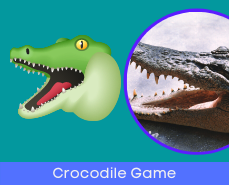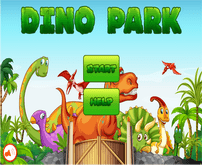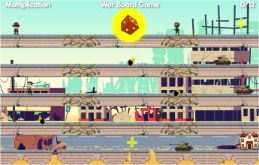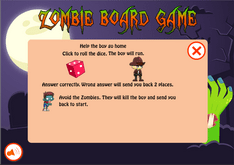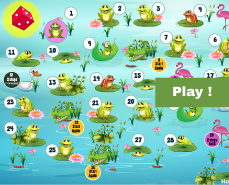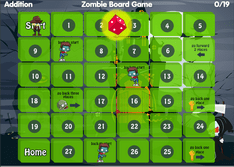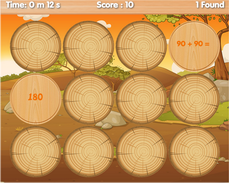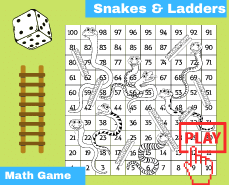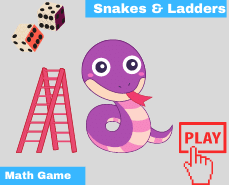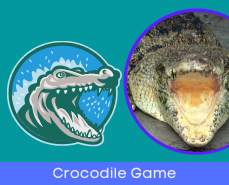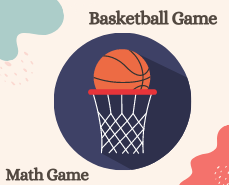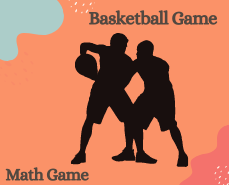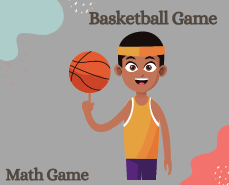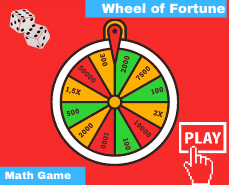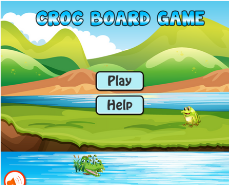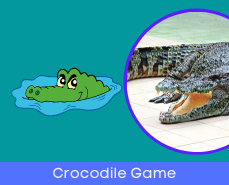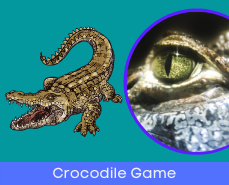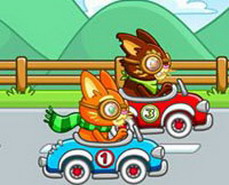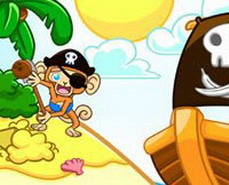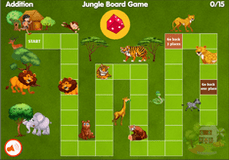Kindergarten Math Games - Preschool Math Games
Kindergarten math games - There are lots of fun math games for preschool and kindergarten here. Learning math must not be boring. These games provide fun practice which appeals to kids. Parents and teachers need to help kids play this game. Follow the links below to access games by levels. Fun Games offered: Penalty Shooting Game, Basketball Game, Fling the teacher, En Garde Duel Game, Memory Game, Walk the plank.The En Garde Duel Games can be a bit violent for some cultures so judge if you think it is worth using. Counting activities for preschool, Subtraction games for kindergarten, fun math activities for kids
On this page, children in pre-k and kindergarten will review varied math skills through the medium of fun games. We offer pirate games in which children solve math problems while trying to beat the pirates at sea. With our croc games collection, children will have fun with crocodiles in a swamp with the ultimate goal of arriving home safely but also beating the crocodiles. There are also free car games for kindergarten and preschool in which children solve math problems while seeking to arrive at a final destination. The dinos online math games is another fun game type we offer in this site. It is a board game with a prehistoric dinosaur theme which children use to learn several skills at this level. The memory matching game online is another catchy activity we offer. Children will be required to solve problems and find the corresponding asnwer by opening a set of wooden boxes that are covered. The spin the wheel math game is another game type that children at this level love. Players are required to spin a wheel, earn points and answer questions. You may be lucky to accumulate a lot of points just from spinning the wheel. We also offer math war games for kinder and preschool. It is fun and violence is kept out for this level. The player is only trying to get home safely while avoiding land mines. The math zombie tsunami game is another fun game for the Halloween which children will love. The aim is to beat the zombies and arrive home safely. Our collection of games cover preschool math topics like: shapes, numbers, counting, spelling numbers, telling time, recognizing coins, spatial sense, addition and subtraction. We keep updating our collection. Come back for more.
The pre-kindergarten years of children are crucial in learning all the basics of mathematics. This is where the kids are taught the fundamentals of mathematics and basic principles by playing engaging games in preparation for the kindergarten stage. Part of the research is achieved in an enjoyable period during which students can quickly comprehend math concepts. But as kids, we all know that sometimes, they love to play a little too much and their attention is more into having fun than learning. As a teacher or a parent, what will you do? Jump into the fray, of course! Thanks to the many pre-kindergarten math games available online, you no longer have to worry about making the whole learning process fun. These math games are designed to empower and motivate children through fun playing sessions. The kids will compose, play, practice, and learn from games that they love and interact with. These math games will help the children learn what numbers are, as well as recognise shapes. This is also where kids start to connect figures and numbers. So it is important that learning for pre-k is visual and playful. And that is what the pre-k math games aim to provide, an experience that is not only visually-appealing but also a lot of fun!
How do you introduce math to kindergarten?
Introducing math to kindergarten students can be a fun and rewarding experience for both the teacher and the students. Math is an essential part of daily life and it is important to start building the foundation for mathematical understanding early on. The key to success is making math relevant, hands-on, and interactive. There are many different ways to introduce math to kindergarten students. One of the most effective ways is through hands-on activities and games. For example, counting and sorting objects, such as buttons or blocks, can be a fun way to introduce basic concepts of counting and grouping. Another hands-on activity is to use manipulatives, such as counting bears or blocks, to explore basic operations like addition and subtraction. These activities are not only fun for the students, but they also help to build their understanding of mathematical concepts. It is also important to incorporate math concepts into daily routines and activities. For example, measuring ingredients while cooking or counting steps while walking can be a great way to make math relevant and real-life. This helps students to understand that math is not just something that they do in the classroom, but it is a part of everyday life. Additionally, it is essential to use age-appropriate language when introducing math to kindergarten students. Instead of using technical terms or jargon, it is best to use simple, clear language that the students can understand. Another important aspect of introducing math to kindergarten students is providing plenty of positive reinforcement and encouragement. Students need to feel confident in their abilities and be praised for their efforts. It is important to celebrate their successes and to provide constructive feedback on areas that need improvement. This helps to build their self-esteem and their understanding of mathematical concepts. One of the most important concepts to introduce in kindergarten math is number recognition and counting. This is the foundation for all other mathematical concepts and it is important to build a solid understanding of numbers early on. This can be done through activities such as counting objects, number matching, and number writing. Additionally, it is important to introduce basic concepts of addition and subtraction. This can be done through activities such as counting bears, using blocks, or using number lines. Another important concept to introduce in kindergarten math is geometry. This includes concepts such as shapes, patterns, and spatial relationships. This can be done through activities such as shape matching, shape building, and pattern recognition. Additionally, it is important to introduce basic concepts of measurement. This can be done through activities such as measuring objects, comparing sizes, and using non-standard units of measurement. It's also important to introduce the concept of Time, It can be done through activities such as telling time using a clock, matching digital and analog time, and sequencing events. Furthermore, it is important to introduce problem-solving and critical thinking skills in kindergarten math. This can be done through activities such as solving simple word problems, pattern recognition, and logical reasoning. This helps students to develop the skills they need to think critically and to solve problems in real-life situations.
In conclusion, introducing math to kindergarten students can be a fun and rewarding experience for both the teacher and the students. The key to success is making math relevant, hands-on, and interactive. By incorporating math into daily routines and activities, using age-appropriate language, and providing plenty of positive reinforcement and encouragement, students can build a solid foundation for mathematical understanding. Additionally, by introducing basic concepts of number recognition and counting, geometry, measurement, time, problem-solving and critical thinking, students will be well on their way to success in math.
Best math games for a 2 year old
As a 2 year old, a child's cognitive abilities are still developing, so it is important to choose math games that are age-appropriate and engaging. Here are a few math games that can help a 2 year old develop their mathematical skills:
-
Counting toys: One of the first math skills a child learns is counting. You can help a 2 year old practice counting by providing them with toys such as counting bears, blocks, or cars. These toys can be used to help a child learn to count up to 10 or even 20.
-
Shape sorters: Shape sorters are great for helping a child learn about different shapes and sizes. These toys come in many different forms, such as blocks, puzzle pieces, or even balls. By playing with shape sorters, a child can learn to recognize different shapes, as well as learn how to fit them together.
-
Number puzzles: Number puzzles are another great way to help a child learn about numbers. These puzzles come in many different forms, such as counting boards, number blocks, or even number cards. By playing with number puzzles, a child can learn to recognize numbers, as well as learn how to count and match numbers.
-
Memory games: Memory games are a great way to help a child improve their memory and concentration skills. These games come in many different forms, such as matching games, picture memory games, or even number memory games. By playing memory games, a child can learn to recognize and remember different numbers, shapes, or pictures.
-
Measurement games: Measurement games can be a great way to help a child learn about measuring things. These games can be as simple as using a measuring tape to measure different objects around the house. Or, you can make a game out of it, such as guessing the length of an object and then measuring it to check if you were correct.
-
Building blocks: Building blocks are a great way to help a child learn about size, shape and spatial relationships. Children can learn to stack blocks, build towers, and create different structures. This can also help with developing fine motor skills.
-
Board games: Board games are a great way to help a child learn about numbers, counting, and strategy. Games such as Chutes and Ladders, Candy Land, and Snakes and Ladders can be a lot of fun for a 2 year old, while also helping them to develop their mathematical skills.
It is important to note that these math games are not only fun but also educational. Children learn best through play, so it's essential to make learning math fun and enjoyable for a 2 year old. Also, it's essential to supervise the child while they play with these games, and make sure they are safe to play with.
Overall, the key to helping a 2 year old develop their mathematical skills is to provide them with a variety of age-appropriate math games that are both fun and engaging. By playing with counting toys, shape sorters, number puzzles, memory games, measurement games, building blocks, and board games, a 2 year old can learn about numbers, counting, shapes, and measurement in a fun and interactive way.
Fun and Educational Kindergarten Games for Young Learners
Are you seeking exciting and educational activities to help your kindergarten child develop essential skills while having a great time? Your quest ends here! We've assembled an extensive collection of fantastic kindergarten games that span a variety of subjects, from mathematics to shapes, and even include some delightful holiday-themed options. In this comprehensive guide, we will explore these games in detail and provide insights into their educational benefits.
Kindergarten Games Educational
-
Kindergarten Addition Games: Mathematics is a fundamental skill that forms the basis for many aspects of life. Helping your child develop strong math skills from an early age is crucial. Kindergarten addition games are a fantastic way to introduce mathematical concepts in an engaging and enjoyable manner.
Addition games for kindergartners often involve using visual aids, such as colorful counters or digital manipulatives, to help children grasp the concept of adding numbers together. They can also feature fun animations and interactive challenges that keep young minds motivated and focused.
The educational benefits of kindergarten addition games include:
- Numerical Fluency: Children learn to recognize numbers and their associations, leading to improved numerical fluency.
- Problem-Solving: Addition games encourage critical thinking and problem-solving skills as children figure out how to combine numbers to reach a specific sum.
- Math Confidence: Success in these games boosts children's confidence in their math abilities.
-
Kindergarten Counting Games: Counting is one of the fundamental skills that children begin to develop in their early years. Counting games for kindergartners help solidify this skill and make it an exciting adventure.
These games often incorporate elements like counting objects, animals, or even imaginary characters. Children might be asked to count apples on a tree, animals in a zoo, or stars in the night sky. By engaging in these activities, they not only learn to count but also improve their number recognition and sequencing skills.
The educational benefits of kindergarten counting games include:
- Number Recognition: Children become familiar with numbers and learn to identify them.
- Sequencing: Counting games help children understand the order of numbers and how they relate to one another.
- Basic Math Skills: These games lay the foundation for more complex math concepts by teaching the fundamental skill of counting.
-
Kindergarten Subtraction Games: Subtraction can be a challenging concept for young learners, but it is a vital mathematical skill. Kindergarten subtraction games make this concept more accessible and enjoyable.
These games often employ visuals and interactive elements to help children understand the concept of taking away. Whether it's subtracting cookies from a plate or fish from a pond, these games make subtraction tangible and comprehensible.
The educational benefits of kindergarten subtraction games include:
- Subtraction Comprehension: Children grasp the idea of "taking away" or "removing" objects.
- Problem Solving: Subtraction games require critical thinking to determine the correct answers.
- Mathematical Fluency: As children practice subtraction, they become more fluent in basic math skills.
-
Kindergarten Shape Games: Understanding shapes is a fundamental skill that has practical applications in everyday life. Kindergarten shape games introduce children to various shapes in an interactive and engaging way.
These games often feature colorful shapes that children can manipulate and match to their corresponding outlines. Some games also incorporate real-world examples of shapes, such as identifying circles in objects like wheels or plates.
The educational benefits of kindergarten shape games include:
- Shape Recognition: Children learn to identify and differentiate between common shapes like circles, squares, triangles, and rectangles.
- Spatial Awareness: Shape games enhance spatial awareness by requiring children to fit shapes into specific spaces.
- Preparation for Geometry: Early exposure to shapes lays the foundation for more advanced geometry concepts.
-
Kindergarten Christmas Games: The holiday season is a magical time for children, and incorporating educational games with a festive twist can make learning even more enjoyable. Kindergarten Christmas games combine the joy of the season with valuable learning experiences.
These games often involve activities like decorating Christmas trees, solving holiday-themed puzzles, or even helping Santa Claus deliver gifts. By infusing learning into holiday festivities, children can stay engaged and continue to develop their skills during the holiday break.
The educational benefits of kindergarten Christmas games include:
- Holiday Spirit: These games instill a sense of excitement and anticipation for the holiday season.
- Problem Solving: Christmas-themed puzzles and challenges enhance critical thinking skills.
- Memory and Attention: Games that involve remembering patterns or sequences improve memory and attention span.
-
Kindergarten Board Games: While digital games have their place, traditional board games are a timeless and valuable resource for kindergartners. Board games designed for this age group offer a unique opportunity for social interaction and skill development.
These games often focus on cooperative play, where children work together to achieve a common goal, or they involve simple rules and colorful game boards that captivate young players. Board games can cover a wide range of educational topics, from language skills to math and logic.
The educational benefits of kindergarten board games include:
- Social Skills: Cooperative board games promote teamwork and communication.
- Critical Thinking: Many board games require strategic thinking and planning.
- Physical Dexterity: Some board games involve fine motor skills and hand-eye coordination.
-
Kindergarten Games on Computer: In today's digital age, computer games can be excellent learning tools when chosen carefully. Kindergarten games on computers and tablets offer interactive and engaging experiences that can reinforce early literacy, numeracy, and problem-solving skills.
These games come in various formats, including apps and websites, and cover a wide range of educational topics. Whether it's practicing letter recognition, exploring basic math concepts, or solving puzzles, computer-based games can provide valuable learning opportunities.
The educational benefits of kindergarten games on computers include:
- Interactive Learning: Children can actively engage with educational content.
- Personalized Learning: Some computer games adapt to a child's skill level, providing tailored challenges.
- Digital Literacy: Familiarity with technology is an essential skill in the modern world.
By incorporating these diverse kindergarten games into your child's daily routine, you can make learning a fun and enjoyable experience. Each type of game offers unique educational benefits and can cater to your child's individual interests and learning style. Whether your little one is mastering addition and subtraction, exploring the world of shapes, or getting into the holiday spirit, these games provide the perfect blend of education and entertainment.
Choosing the Right Kindergarten Game for Your Child
Now that we've explored various kindergarten games and their educational advantages, you might be wondering how to select the right games for your child. Here are some tips to help you make informed choices:
-
Consider Your Child's Interests: Pay attention to what your child enjoys. If they have a particular interest in animals, you might choose counting games that involve animals. Tailoring the games to their interests can enhance engagement.
-
Assess Their Skill Level: It's important to choose games that align with your child's current skill level. Games that are too easy may become boring, while those that are too challenging can lead to frustration. Look for games that provide a suitable level of challenge.
-
Balance Screen Time: While computer-based games can be valuable, it's essential to strike a balance between screen time and other activities. Encourage a mix of digital and physical play to support your child's overall development.
-
Read Reviews and Recommendations: Seek out reviews and recommendations from parents and educators. They can provide insights into which games are effective and enjoyable for kindergarten-aged children.
-
Engage with Your Child: Whenever possible, play the games together with your child. This not only strengthens your bond but also allows you to monitor their progress and provide guidance when needed.
-
Encourage Variety: Don't limit your child to just one type of game. Variety in learning activities helps stimulate different areas of their brain and keeps them engaged.
The Role of Educational Games in Kindergarten
Educational games play a crucial role in a child's kindergarten experience. They offer a bridge between formal education and play, allowing children to learn while having fun. Here are some key advantages of incorporating educational games into your child's kindergarten routine:
-
Active Learning: Educational games encourage active participation and engagement. Children are more likely to absorb information and concepts when they are actively involved in the learning process.
-
Motivation and Engagement: Games are inherently motivating. They provide immediate feedback and rewards, which can boost a child's confidence and enthusiasm for learning.
-
Skill Development: Educational games target specific skills, whether it's math, language, or social skills. They provide focused practice in these areas, helping children develop proficiency.
-
Problem Solving and Critical Thinking: Many educational games present challenges that require problem-solving and critical thinking skills. These skills are essential for academic success and lifelong learning.
-
Individualized Learning: Some educational games adapt to the learner's level of competence, providing a personalized learning experience. This ensures that children receive appropriate challenges and support.
-
Preparation for School: Educational games can help prepare children for the academic demands of school. They introduce concepts and skills that they will encounter in formal education.
Incorporating Educational Games into Daily Life
To make the most of educational games in your child's kindergarten journey, consider integrating them into their daily routine. Here are some practical tips for doing so:
-
Establish a Schedule: Set aside specific times for educational games, just as you would for other activities like reading or outdoor play. Consistency helps reinforce learning.
-
Create a Learning Environment: Designate a space in your home where your child can comfortably play educational games. Ensure it is free from distractions and well-stocked with age-appropriate games.
-
Rotate Games: Keep a selection of games on hand and rotate them regularly to prevent boredom. New challenges and experiences can maintain your child's interest.
-
Celebrate Achievements: Celebrate your child's progress and achievements in the games. Recognize their efforts and offer praise and encouragement.
-
Combine Games with Real-Life Experiences: Whenever possible, connect what your child learns in games to real-life situations. For example, if they learn about shapes in a game, point out shapes in the environment when you're out and about.
-
Stay Informed: Keep up with educational trends and recommendations. New games and apps are continually being developed, and staying informed can help you discover the latest and most effective resources.
Conclusion
In conclusion, educational games for kindergartners are valuable tools for fostering learning and development in a fun and engaging way. Whether your child is exploring the world of numbers through addition and subtraction games, developing spatial awareness with shape games, or getting into the holiday spirit with Christmas-themed activities, these games offer a wealth of educational benefits.
By choosing games that align with your child's interests and skill level, maintaining a balance between screen time and other activities, and actively engaging with your child during playtime, you can provide them with a solid foundation for future learning success. Educational games not only make learning enjoyable but also empower children with essential skills that will serve them well throughout their academic journey and beyond. So, let the learning adventures begin!
![]() Addition math practice - pirates at sea game
Addition math practice - pirates at sea game
![]() Counting from 1 to 3 - Rally car race game
Counting from 1 to 3 - Rally car race game
![]() Counting up to 10 - Catapult game
Counting up to 10 - Catapult game
![]() Counting up to 5 - Pirate game
Counting up to 5 - Pirate game
![]() Learn numbers beyond 20 - rally game
Learn numbers beyond 20 - rally game
![]() Patterns - Pirates at sea game
Patterns - Pirates at sea game
![]() Skip - counting - Pirate game
Skip - counting - Pirate game
![]() Spelling numbers up to ten - Rally car race game
Spelling numbers up to ten - Rally car race game
![]() Spelling numbers up to 20 - Moonshoot voyage game
Spelling numbers up to 20 - Moonshoot voyage game
![]() Subtraction - Car rally game
Subtraction - Car rally game
![]() Time related facts - Moonshoot voyage game
Time related facts - Moonshoot voyage game
![]() Ways to make numbers - Moonshoot voyage game
Ways to make numbers - Moonshoot voyage game
![]() Counting from 1 to 10 and addition game - Penalty shoot game
Counting from 1 to 10 and addition game - Penalty shoot game
![]() Counting Tally Marks Memory Game
Counting Tally Marks Memory Game
- Counting 1 to 10
- Counting 11 to 20
- Counting 21 to 30
- Counting by tens, fives and fours up to 100
- Counting by twos
- Counting from 30 to 100
- Even and odd numbers
- Ordinal numbers
![]() Spelling Numbers from 1 to 6 Memory game with pictures
Spelling Numbers from 1 to 6 Memory game with pictures
![]() Spelling Numbers from 7 to 12 Memory game with pictures
Spelling Numbers from 7 to 12 Memory game with pictures
![]() Addition memory game with pictures for Pre - K and Kindergarten
Addition memory game with pictures for Pre - K and Kindergarten
![]() Addition memory game for Pre - K and Kindergarten
Addition memory game for Pre - K and Kindergarten
![]() Addition game - Audio game adding numbers - matching answers
Addition game - Audio game adding numbers - matching answers
![]() Addition snakes and ladders game for Pre-K and Kindergarten
Addition snakes and ladders game for Pre-K and Kindergarten
![]() Addition Game - Basketball game
Addition Game - Basketball game
![]() Addition Game -Penalty shoot game
Addition Game -Penalty shoot game
![]() Addition Game- Fling the teacher game
Addition Game- Fling the teacher game
![]() Snakes and ladders addition game for Pre-k and Kindergarten
Snakes and ladders addition game for Pre-k and Kindergarten
![]() Subtractions Game- En garde Duel Game
Subtractions Game- En garde Duel Game
![]() Subtractions Game- Memory Game
Subtractions Game- Memory Game
![]() Fractions with pictures memory game
Fractions with pictures memory game
![]() Shapes - Triangle , Pentagon, Hexagon, Square ...... memory game
Shapes - Triangle , Pentagon, Hexagon, Square ...... memory game
![]() Geometry- Shapes: forming a Circle (sphere) puzzle game
Geometry- Shapes: forming a Circle (sphere) puzzle game
![]() Geometry - shapes: create a hexagon from the puzzle
Geometry - shapes: create a hexagon from the puzzle
![]() Geometry- Shapes : create a square from the squares in the puzzle
Geometry- Shapes : create a square from the squares in the puzzle
![]() Counting from 1 to 10 and addition game- Walk the plank game
Counting from 1 to 10 and addition game- Walk the plank game
![]() Place value of numbers Hendreds, Tens, Units memory game
Place value of numbers Hendreds, Tens, Units memory game
![]() Number rearrangement Game- Arrange in order- walk the plank game
Number rearrangement Game- Arrange in order- walk the plank game
![]() Comparisons Game- En Garde Duel Game
Comparisons Game- En Garde Duel Game
![]() Geometry Game- Fing the teacher game
Geometry Game- Fing the teacher game
![]() Missing Number Game -Penalty shoot game
Missing Number Game -Penalty shoot game
![]() Subtraction Game 1 -10- En gard duel game
Subtraction Game 1 -10- En gard duel game
![]() Subtraction Game 1 - 10 - Fling the teacher game
Subtraction Game 1 - 10 - Fling the teacher game
![]() Subtraction Game - Basketball game
Subtraction Game - Basketball game
![]() Subtraction Game - Fling the teacher
Subtraction Game - Fling the teacher
![]() Telling the time game - memory game
Telling the time game - memory game
![]() Number Spelling Game - Memory Game
Number Spelling Game - Memory Game
![]() Number Spelling Game - Walk the plank game
Number Spelling Game - Walk the plank game
![]() Numbers above ten fling the teacher game
Numbers above ten fling the teacher game
![]() Numbers above ten football game
Numbers above ten football game
![]() Numbers above ten Grade or no Grade Game
Numbers above ten Grade or no Grade Game
![]() Numbers above ten walk the plank game
Numbers above ten walk the plank game
![]() Even or Odd numbers basketball game
Even or Odd numbers basketball game
![]() Even or Odd numbers fling the teacher game
Even or Odd numbers fling the teacher game
![]() Even or Odd numbers football game
Even or Odd numbers football game
![]() Even or Odd numbers Grade or No Grade game
Even or Odd numbers Grade or No Grade game
![]() Even or Odd numbers Walk the Plank game
Even or Odd numbers Walk the Plank game
![]() Number line Fling the teacher game
Number line Fling the teacher game
![]() Number line Walk the Plank game
Number line Walk the Plank game
![]() Fractions Fling the Teacher game
Fractions Fling the Teacher game
![]() Fractions Grade or no Grade game
Fractions Grade or no Grade game
![]() Mixed Math Operations - Basketball Game
Mixed Math Operations - Basketball Game
![]() Mixed Math Operations - En Garde Duel Game
Mixed Math Operations - En Garde Duel Game
![]() Mixed Math Operations - Grade or no Grade Game
Mixed Math Operations - Grade or no Grade Game
![]() Mixed Math Operations - MCQ Game
Mixed Math Operations - MCQ Game
![]() Mixed Math Operations - Walk the Plank Game
Mixed Math Operations - Walk the Plank Game
![]() Subtractions - En Garde Duel Game
Subtractions - En Garde Duel Game
![]() Subtractions - Basketball Game
Subtractions - Basketball Game
![]() Subtractions - Grade or no Grade Game
Subtractions - Grade or no Grade Game
![]() Statistics grade or no grade Game
Statistics grade or no grade Game

